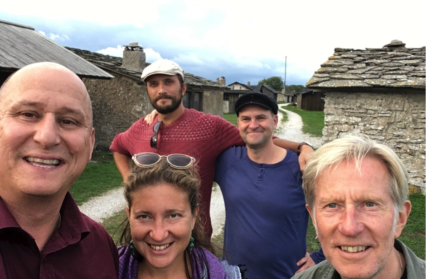A shipful of storytellers sailed to Swansea, told their tales to schoolchildren at the National Waterfront Museum, and sailed back to Cardiff for an adult program the same evening. Thomas Tyrrell was present for the reverie and tall tales told by Ship of Fools.

The Norwegian Church is one of my favourite landmarks on my favourite stretch of the Bay, which runs from the Senedd past the Victorian frontage of The Waterguard and the memorial sculptures to Merchant Navy and Robert Falcon Scott. As Cardiff Council looks into new ways of leasing out its heritage buildings, however, the head of the Welsh Norwegian Society recently warned of the possibility of it being turned into a Starbucks or a McDonalds. I admit that as often as I pass it, I rarely go inside; the building is unique and full of character, but both as a café and as an art gallery, it does things that are done as good or better elsewhere in the bay.
Stories From The Ship Of Fools, however, is a perfect example of how the Norwegian Church can best be used, an event that would never have had the same resonance if it were performed elsewhere. On a long hot midsummer evening, a large crowd gathered to hear storytellers from Wales, Italy and Sweden recently arrived by sea from Swansea. As part of Beyond the Border storytelling festival’s Roots and Roads programme, future events with the same artists are planned in the Llyn Peninsula and Felin Uchaf.
Welsh storyteller David Ambrose capitalised on the location by kicking things off with a story about a Norwegian sailor lost in Tiger Bay, reconnecting us to a time when Norwegian shanties could be heard echoing out of pubs all across the bay. Over the course of the next two hours, we sang songs in three languages, learnt how Genoese women deal with pirates, how pesto was invented, and how many Norwegians it takes to change a lightbulb (according to the Swedish).

Despite the burden of speaking in their second language, the European storytellers lost nothing in translation. Paola Balbi held us spellbound with her tales of Genoese life in the wild days when pirates might appear on the coast at any moment, and we listened with rapt attention as scurvy and starvation were avoided by the timely invention of pesto and pasta. Davide Bardi, her compatriot, was a more manic storyteller, relying on dramatic gestures, facial expressions and the frequent use of his guitar. Later on, Johan Theodorssen told us Swedish folk stories with the slightly sinister campness of a Bond villain explaining his plan.
Perhaps it was merely the fact that his story wound up an overlong first half, but Steve Killick seemed to be the junior partner in this gathering of storytellers, and his chosen story from the Arabian Nights didn’t especially complement the nautical themes and national settings of the preceding tales. Individual performances were polished throughout, but this ensemble still needs a little work before it fits together as a complete programme. Apart from anything else, the evening ran dreadfully over time, with the promised two-hour programme stretching out to two-and-a-half hours, and many audience members trickling out before the final tale was told. A long sea voyage is needed for the team to start playing to each other’s strengths and cut down their running time.
Overall, however, I think this Ship of Fools is not to be placed in quarantine but to be welcomed into the harbour. The evening provided a fine opportunity to hear tales from other countries and cultures, to reconnect with our international maritime history, and to encourage our Welsh storytellers to up their game. Long may she sail!
You can find out more about Beyond the Border and Ship of Fools on their website.
Thomas Tyrrell is a regular contributor to Wales Arts Review.










